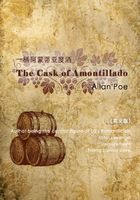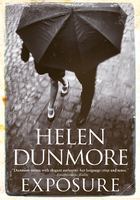It is not to be supposed that such an encounter as Mr. Preston had just had with Roger Hamley sweetened the regards in which the two young men henceforward held each other. They had barely spoken to each other before, and but seldom met; for the land-agent's employment had hitherto lain at Ashcombe, some sixteen or seventeen miles from Hamley. He was older than Roger by several years; but during the time he had been in the county Osborne and Roger had been at school and at college. Mr. Preston was prepared to dislike the Hamleys for many unreasonable reasons. Cynthia and Molly had both spoken of the brothers with familiar regard, implying considerable intimacy; their flowers had been preferred to his on the occasion of the ball; most people spoke well of them; and Mr. Preston had an animal's instinctive jealousy and combativeness against all popular young men. Their 'position'—poor as the Hamleys might be—was far higher than his own in the county; and, moreover, he was agent to the great Whig lord, whose political interests were diametrically opposed to those of the old Tory squire. Not that Lord Cumnor troubled himself much about his political interests. His family had obtained property and title from the Whigs at the time of the Hanoverian succession; and so, traditionally, he was a Whig, and had belonged in his youth to Whig clubs, where he had lost considerable sums of money to Whig gamblers. All this was satisfactory and consistent enough. And if Lord Hollingford had not been returned for the county on the Whig interest—as his father had been before him, until he had succeeded to the title—it is quite probable Lord Cumnor would have considered the British constitution in danger, and the patriotism of his ancestors ungratefully ignored. But, excepting at elections, he had no notion of making Whig and Tory a party cry. He had lived too much in London, and was of too sociable a nature, to exclude any man who jumped with his humour, from the hospitality he was always ready to offer, be the agreeable acquaintance Whig, Tory, or Radical. But in the county of which he was lord-lieutenant, the old party distinction was still a shibboleth by which men were tested for their fitness for social intercourse, as well as on the hustings. If by any chance a Whig found himself at a Tory dinner-table—or vice-versa— the food was hard of digestion, and wine and viands were criticized rather than enjoyed. A marriage between the young people of the separate parties was almost as unheard-of and prohibited an alliance as that of Romeo and Juliet's. And of course Mr. Preston was not a man in whose breast such prejudices would die away. They were an excitement to him for one thing, and called out all his talent for intrigue on behalf of the party to which he was allied. Moreover, he considered it as loyalty to his employer to 'scatter his enemies' by any means in his power. He had always hated and despised the Tories in general; and after that interview on the marshy common in front of Silas's cottage, he hated the Hamleys and Roger especially, with a very choice and particular hatred. 'That prig,' as hereafter he always designated Roger—'he shall pay for it yet,' he said to himself by way of consolation, after the father and son had left him. 'What a lout it is!'—watching the receding figure. 'The old chap has twice as much spunk,' as the squire tugged at his bridle-reins. 'The old mare could make her way better without being led, my fine fellow. But I see through your dodge. You're afraid of your old father turning back and getting into another rage. Position indeed! a beggarly squire—a man who did turn off his men just before winter, to rot or starve, for all he cared—it's just like a brutal old Tory.' And, under the cover of sympathy with the dismissed labourers, Mr. Preston indulged his own private pique very pleasantly.
Mr. Preston had many causes for rejoicing: he might have forgotten this discomfiture, as he chose to feel it, in the remembrance of an increase of income, and in the popularity he enjoyed in his new abode. All Hollingford came forward to do the earl's new agent honour. Mr. Sheepshanks had been a crabbed, crusty old bachelor, frequenting inn- parlours on market-days, not unwilling to give dinners to three or four chosen friends and familiars, with whom, in return, he dined from time to time, and with whom, also, he kept up an amicable rivalry in the matter of wines. But he 'did not appreciate female society,' as Miss Browning elegantly worded his unwillingness to accept the invitations of the Hollingford ladies. He was unrefined enough to speak of these invitations to his intimate friends aforesaid in the following manner, 'Those old women's worrying,' but, of course, they never heard of this. Little quarter-of-sheet notes, without any envelopes—that invention was unknown in those days—but sealed in the corners when folded up instead of gummed as they are fastened at present, occasionally passed between Mr. Sheepshanks and the Miss Brownings, Mrs. Goodenough or others. In the first instance, the form ran as follows:—'Miss' Browning and her sister, Miss Phoebe Browning, present their respectful compliments to Mr. Sheepshanks, and beg to inform him that a few friends have kindly consented to favour them with their company at tea on Thursday next. Miss Browning and Miss Phoebe will take it very kindly if Mr. Sheepshanks will join their little circle.'
Now for Mrs. Goodenough:—
'Mrs. Goodenough's respects to Mr. Sheepshanks, and hopes he is in good health. She would be very glad if he would favour her with his company to tea on Monday. My daughter, in Combermere, has sent me a couple of guinea fowls, and Mrs. Goodenough hopes Mr. Sheepshanks will stay and take a bit of supper.'
No need for the dates of the days of the month. The good ladies would have thought that the world was coming to an end if the invitation had been sent out a week before the party therein named. But not even guinea-fowls for supper could tempt Mr. Sheepshanks. He remembered the made-wines he had tasted in former days at Hollingford parties, and shuddered. Bread-and-cheese, with a glass of bitter-beer, or a little brandy-and-water, partaken of in his old clothes (which had worn into shapes of loose comfort, and smelt strongly of tobacco), he liked better than roast guinea-fowl and birch-wine, even without throwing into the balance the stiff uneasy coat, and the tight neckcloth and tighter shoes. So the ex-agent had been seldom, if ever, seen at the Hollingford tea-parties. He might have had his form of refusal stereotyped, it was so invariably the same.
'Mr. Sheepshanks' duty to Miss Browning and her sister' (to Mrs Goodenough, or to others, as the case might be). 'Business of importance prevents him from availing himself of their polite invitation; for which he begs to return his best thanks.'
But now that Mr. Preston had succeeded, and come to live in Hollingford, things were changed.
He accepted every civility right and left, and won golden opinions accordingly. Parties were made in his honour, 'just as if he had been a bride,' Miss Phoebe Browning said; and to all of them he went.
'What's the man after?' said Mr. Sheepshanks to himself, when he heard of his successor's affability, and sociability, and amiability, and a variety of other agreeable 'ilities,' from the friends whom the old steward still retained at Hollingford.
'Preston's not a man to put himself out for nothing. He's deep. He'll be after something solider than popularity.'
The sagacious old bachelor was right. Mr. Preston was 'after' something more than mere popularity. He went wherever he had a chance of meeting Cynthia Kirkpatrick.
It might be that Molly's spirits were more depressed at this time than they were in general; or that Cynthia was exultant, unawares to herself, in the amount of attention and admiration she was receiving from Roger by day, from Mr. Preston in the evenings, but the two girls seemed to have parted company in cheerfulness. Molly was always gentle, but very grave and silent. Cynthia, on the contrary, was merry, full of pretty mockeries, and hardly ever silent. When first she came to Hollingford, one of her great charms had been that she was such a gracious listener; now her excitement, by whatever caused, made her too restless to hold her tongue; yet what she said was too pretty, too witty, not to be a winning and sparkling interruption, eagerly welcomed by those who were under her sway. Mr Gibson was the only one who observed this change, and reasoned upon it.
'She is in a mental fever of some kind,' thought he to himself. 'She is very fascinating, but I don't quite understand her.' If Molly had not been so entirely loyal to her friend, she might have thought this constant brilliancy a little tiresome when brought into every-day life; it was not the sunshiny rest of a placid lake, it was rather the glitter of the pieces of a broken mirror, which confuses and bewilders. Cynthia would not talk quietly about anything now; subjects of thought or conversation seemed to have lost their relative value. There were exceptions to this mood of hers, when she sank into deep fits of silence, that would have been gloomy had it not been for the never varying sweetness of her temper. If there was a little kindness to be done to either Mr Gibson or Molly, Cynthia was just as ready as ever to do it; nor did she refuse to do anything her mother wished, however fidgety might be, the humour that prompted the wish. But in this latter case Cynthia's eyes were not quickened by her heart.
Molly was dejected, she knew not why. Cynthia had drifted a little apart; that was not it. Her stepmother had whimsical moods; and if Cynthia displeased her, she would oppress Molly with small kindnesses and pseudo-affection. Or else everything was wrong, the world was out of joint, and Molly had failed in her mission to set it right, and was to be blamed accordingly. But Molly was of too steady a disposition to be much moved by the changeableness of an unreasonable person. She might be annoyed, or irritated, but she was not depressed. That was not it. The real cause was certainly this. As long as Roger was drawn to Cynthia, and sought her of his own accord, it had been a sore pain and bewilderment to Molly's heart; but it was a straightforward attraction, and one which Molly acknowledged, in her humility and great power of loving, to be the most natural thing in the world. She would look at Cynthia's beauty and grace, and feel as if no one could resist it. And when she witnessed all the small signs of honest devotion which Roger was at no pains to conceal, she thought, with a sigh, that surely no girl could help relinquishing her heart to such tender, strong keeping as Roger's character ensured. She would have been willing to cut off her right hand, if need were, to forward his attachment to Cynthia; and the self-sacrifice would have added a strange zest to a happy crisis. She was indignant at what she considered to be Mrs. Gibson's obtuseness to so much goodness and worth; and when she called Roger 'a country lout', or any other depreciative epithet, Molly would pinch herself in order to keep silent. But after all those were peaceful days compared to the present, when she, seeing the wrong side of the tapestry, after the wont of those who dwell in the same house with a plotter, became aware that Mrs. Gibson had totally changed her behaviour to Roger, from some cause unknown to Molly.
But he was always exactly the same; 'steady as old Time,' as Mrs Gibson called him, with her usual originality; 'a rock of strength, under whose very shadow there is rest,' as Mrs. Hamley had once spoken of him. So the cause of Mrs. Gibson's altered manner lay not in him. Yet now he was sure of a welcome, let him come at any hour he would. He was playfully reproved for having taken Mrs. Gibson's words too literally, and for never coming before lunch. But he said he considered her reasons for such words to be valid, and should respect them. And this was done out of his simplicity, and from no tinge of malice. Then in their family conversations at home, Mrs Gibson was constantly making projects for throwing Roger and Cynthia together, with so evident a betrayal of her wish to bring about an engagement, that Molly chafed at the net spread so evidently, and at Roger's blindness in coming so willingly to be entrapped. She forgot his previous willingness, his former evidences of manly fondness for the beautiful Cynthia; she only saw plots of which he was the victim, and Cynthia the conscious if passive bait. She felt as if she could not have acted as Cynthia did; no, not even to gain Roger's love. Cynthia heard and saw as much of the domestic background as she did, and yet she submitted to the role assigned to her! To be sure, this role would have been played by her unconsciously; the things prescribed were what she would naturally have done; but because they were prescribed—by implication only, it is true—Molly would have resisted; have gone out, for instance, when she was expected to stay at home; or have lingered in the garden when a long country walk was planned. At last—for she could not help loving Cynthia, come what would—she determined to believe that Cynthia was entirely unaware of all; but it was with an effort that she brought herself to believe it.
It may be all very pleasant 'to sport with Amaryllis in the shade, or with the tangles of Neaera's hair,' but young men at the outset of their independent life have many other cares in this prosaic England to occupy their time and their thoughts. Roger was Fellow of Trinity, to be sure; and from the outside it certainly appeared as if his position, as long as he chose to keep unmarried, was a very easy one. His was not a nature, however, to sink down into inglorious ease, even had his fellowship income been at his disposal. He looked forward to an active life; in what direction he had not yet determined. He knew what were his talents and his tastes; and did not wish the former to lie buried, nor the latter, which he regarded as gifts, fitting him for some peculiar work, to be disregarded or thwarted. He rather liked awaiting an object, secure in his own energy to force his way to it, when he once saw it clearly. He reserved enough of money for his own personal needs, which were small, and for the ready furtherance of any project he might see fit to undertake; the rest of his income was Osborne's; given and accepted in the spirit which made the bond between these two brothers so rarely perfect. It was only the thought of Cynthia that threw Roger off his balance. A strong man in everything else, about her he was as a child. He knew that he could not marry and retain his fellowship; his intention was to hold himself loose from any employment or profession until he had found one to his mind, so there was no immediate prospect—no prospect for many years, indeed, that he would be able to marry. Yet he went on seeking Cynthia's sweet company, listening to the music of her voice, basking in her sunshine, and feeding his passion in every possible way, just like an unreasoning child. He knew that it was folly—and yet he did it; and it was perhaps this that made him so sympathetic with Osborne. Roger racked his brains about Osborne's affairs much more frequently than Osborne troubled himself. Indeed, he had become so ailing and languid of late, that even the squire made only very faint objections to his desire for frequent change of scene, though formerly he used to grumble so much at the necessary expenditure it involved.
'After all, it does not cost much,' the squire said to Roger one day. 'Choose how he does it, he does it cheaply; he used to come and ask me for twenty, where now he does it for five. But he and I have lost each other's language, that's what we have! and my dictionary' (only he called it 'dixonary') 'has all got wrong because of those confounded debts—which he will never explain to me, or talk about—he always holds me off at arm's length when I begin upon it—he does, Roger—me, his old dad, as was his primest favourite of all, when he was a little bit of a chap!'
The squire dwelt so much upon Osborne's reserved behaviour to himself' that brooding over this one subject perpetually he became more morose and gloomy than ever in his manner to Osborne, resenting the want of the confidence and affection that he thus repelled. So much so that Roger, who desired to avoid being made the receptacle of his father's complaints against Osborne—and Roger's passive listening was the sedative his father always sought—had often to have recourse to the discussion of the drainage works as a counter-irritant. The squire had felt Mr. Preston's speech about the dismissal of his workpeople very keenly; it fell in with the reproaches of his own conscience, though, as he would repeat to Roger over and over again,—'I could not help it—how could I?—I was drained dry of ready money—I wish the land was drained as dry as I am,' said he, with a touch of humour that came out before he was aware, and at which he smiled sadly enough. 'What was I to do, I ask you, Roger? I know I was in a rage—I've had a deal to make me so—and maybe I did not think as much about consequences as I should ha' done, when I gave orders for 'em to be sent off; but I could not have done otherwise if I'd ha' thought for a twelvemonth in cool blood. Consequences! I hate consequences; they've always been against me; they have. I'm so tied up I can't cut down a stick more, and that's a "consequence" of having the property so deucedly well settled; I wish I'd never had any ancestors. Ay, laugh, lad! it does me good to see thee laugh a bit, after Osborne's long face, which always grows longer at sight o' me!'
'Look here, father!' said Roger suddenly, 'I'll manage somehow about the money for the works. You trust to me; give me two months to turn myself in, and you shall have some money, at any rate, to begin with.'
The squire looked at him, and his face brightened as a child's does at the promise of a pleasure made to him by some one on whom he can rely. He became a little graver, however, as he said,—'But how will you get it? It's hard enough work.'
'Never mind; I'll get it—a hundred or so at first—I don't yet know how—but remember, father, I'm a Senior Wrangler, and a "very promising young writer," as that review called me. Oh, you don't know what a fine fellow you've got for a son. You should have read that review to know all my wonderful merits.'
'I did, Roger. I heard Gibson speaking of it, and I made him get it for me. I should have understood it better if they could have called the animals by their English names, and not put so much of their French jingo into it.'
'But it was an answer to an article by a French writer,' pleaded Roger.
'I'd ha' let him alone!' said the squire earnestly. 'We had to beat 'em, and we did it at Waterloo; but I'd not demean myself by answering any of their lies, if I was you. But I got through the review, for all their Latin and French; I did, and if you doubt me, you just look at the end of the great ledger, turn it upside down, and you'll find I've copied out all the fine words they said of you: "careful observer," "strong nervous English," "rising philosopher." Oh! I can nearly say it all off by heart, for many a time when I am frabbed by bad debts, or Osborne's bills, or moidered with accounts, I turn the ledger wrong way up, and smoke a pipe over it, while I read those pieces out of the review which speak about you, lad!'















